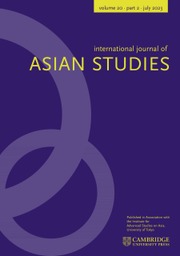THE EMERGENCE OF PEASANT SOCIETIES IN EAST ASIA
Published online by Cambridge University Press: 10 December 2004
Abstract
In the recent debates about Confucianism and its role in East Asian economic development, there has been little discussion about why East Asian societies embraced Confucian values in the first place. Here, “Confucian” refers particularly to the ideas of the Song dynasty Zhu Xi school (neo-Confucianism) which became associated in China with the shidafu scholar-bureaucrat class. Zhu Xi political philosophy was anchored in a centralized governing bureaucracy under the emperor, and differed markedly from political ideals underlying medieval feudal society in Europe, for example. Land-ownership was not a condition of shidafu status, and there is only a partial resemblance between the Chinese landowner and European feudal ruling strata. In Japan and Korea, notwithstanding the fact that neo-Confucianism was an imported philosophy and there arose discrepancies between its ideas and social reality, it sank deep roots into both societies. This paper looks at the conditions that allowed this to happen, and concludes that the spread of Confucian ideas depended on structural changes in Korea and Japan that were similar to those that had occurred in China. It is in the emergence of peasant society that we find the key to such changes. This, I contend, is a far more important watershed than the one that divides early-modern and modern.
- Type
- Research Article
- Information
- Copyright
- © Cambridge University Press 2004
Footnotes
- 1
- Cited by


